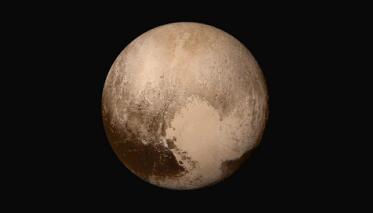
Mackle came to visit Grandpa today. As soon as he arrived, he went to Grandpa's study. This was not only a 'treasure room' to Grandpa, but also a place full of fun to Mackle. Mackle usually went there to search for new books Grandpa had bought, and read when he came up with interesting ones. This time, Mackle decided to find something different. He found out a box of old books. These books were there before he was born. Most of them were worn and yellowed. Nevertheless, they still arouse Mackle's interest. He was turning pages, one book after another. Suddenly, he saw a book about the universe. It read, "There are nine planets in the solar system: Mercury, Venus, Earth, Mars, Jupiter, Saturn, Uranus, Neptune, and Pluto." "Something is wrong!" He recollected that his teacher said there are eight planets in the solar system, and he had never heard of Pluto. Mackle felt it was weird. Did the book make a mistake?
In order to figure out the answer, Mackle called his good friend, Linda, a little expert in astronomy, "Linda, I saw a book at my Grandpa's home saying that there are nine planets in the solar system. But I remember quite clearly that our teacher said there are eight planets. What is Pluto?" Linda did not answer his question directly, but just asked him to find out when the book was published. Mackle found it was published in 2000. Then she replied, "What you don't know is that Pluto used to be a member of the solar system." Mackle was surprised and said, "Ah! I have never heard of it. Linda, tell me what happened."
Linda explained, "Pluto was discovered in 1930, and it was considered as a planet at that time. So people always said that the solar system had nine planets. Until 2006, scientists re-examined its qualification as a planet and thought it was unqualified. Pluto was removed from the rank of the solar system planets and became a member of dwarf planets. Since then, the solar system has only eight planets."
Mackle asked, "Why is Pluto not qualified as a planet?"
Linda said, "Scientists deemed that Pluto isn't a planet according to the definition of planet. In 2006, the International Astronomical Union Conference issued a new definition of planet. It includes the following three requirements: a celestial body (a) is in orbit around the Sun, (b) has sufficient mass for its self-gravity to overcome rigid body forces so that it assumes a hydrostatic equilibrium (nearly round) shape, and (c) has cleared the neighborhood around its orbit. Pluto was proved to be unqualified for the last requirement. On the eight planets’ tracks, there are no other celestial bodies running automatically all year round. Unlike an asteroid, a planet will absorb, capture as a satellite or drive away any object on its track. After 4.5 billion years of competition, the eight planets are the last large objects left in their respective orbit. On the contrary, Pluto has low mass and small diameter. There are too many celestial bodies around the sun that are about the same size as Pluto. If Pluto is still considered as a planet, other celestial bodies may also be regarded as planets. This will lead to the continuous increase in the number of planets in the solar system. Moreover, Pluto is too low in mass to attract satellites running around it. Rather, it spins together with some satellites around a common point between them. It's obvious that Pluto does not clear other objects out of its orbit. In addition, Pluto's orbit is elliptical, and its orbital parameters are completely different from the eight true solar system planets. On August 24, 2006, astronomers voted to downgrade Pluto as a dwarf planet for these reasons."
Mackle said, "I see. The solar system is really interesting. I will learn more about astronomy in the future."
Author: Zhu Yawen

















 京公网安备11010502039775号
京公网安备11010502039775号





